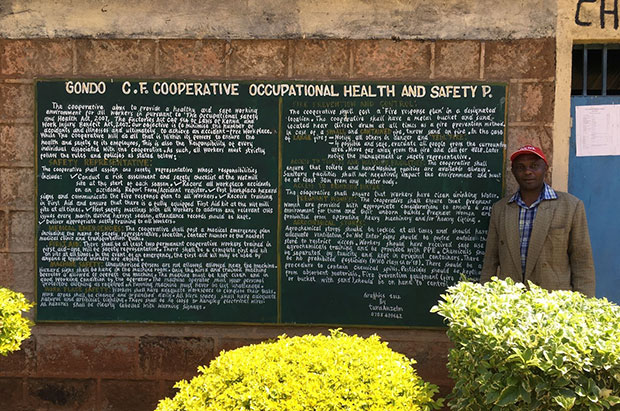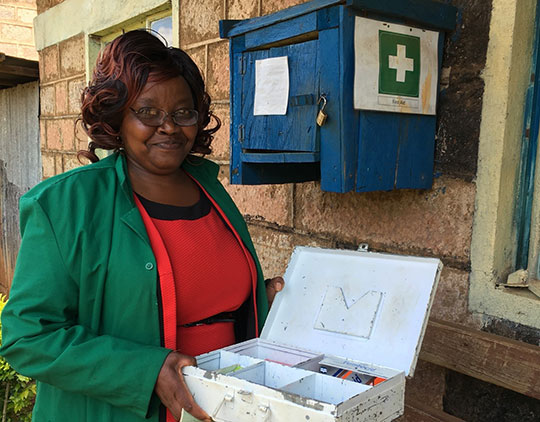-
Producer
-
New Kiriti Farmer's Cooperative Society
-
Country
- Kenya
-
Region
-
Murang'a County
-
Altitude
-
1900m above sea level
-
Varieties
-
Process
-
Harvested
-
February 2018
-
Importer
-
Cafe Imports
-
Body
-
Full
-
Acidity
-
Bright
-
Tasting notes
-
Grape jelly, cherry, currant
-
Roast style
Kenya
Gondo
AaThe Gondo factory is operated by the New Kiriti Farmers Cooperative Society (F.C.S.), which has 560 members. Coffee is picked and brought to the factory that same day for selection and separation, as sorting happens before depulping begins. The ripe cherry is processed using fresh water from the local Kananahu stream, and the coffee is dried under full sun.
The New Kiriti F.C.S. has an executive committee of seven elected members and three supervisory-committee members who oversee the management committee and reports to the farmers in an annual meeting. The society has a workforce of 19 permanent staff and about 25 seasonal workers.
Working with Technoserve
In 2010, the New Kiriti Farmer’s Cooperative Society started working with Technoserve, a not-for-profit which works with enterprising people in the developing world to build competitive farms, businesses, and industries.
They were part of the Technoserve coffee initiative, an eight-year project funded by the Bill & Melinda Gates Foundation to help smallholder coffee farmers in East Africa increase their productivity and incomes.
New Kiriti received training from TechnoServe business advisors on business and financial management, including record-keeping, environmental sustainability, and occupational health and safety practices. “We really didn’t know any of these things. We were very, very far away. But now we are closer,” said Stephen Thuo, secretary manager of New Kiriti.

The cooperative’s health and safety focus, documented on a wall at the wetmill Source: Technoserve
New Kiriti also received training through the Coffee Initiative on labor management to improve worker conditions. Business advisors encouraged management to pay workers according to government minimum wage policies, and today they have exceeded that rate by paying their workers 250 Kenyan shillings a day. In addition, New Kiriti grants each worker 30 days of unpaid leave a year as well as maternity and paternity leave.
When workers exceed their expected hours of work, they receive overtime pay. “We used to have to borrow money to pay salaries from the banks. Now we pay workers on time and we have the money from our own production,” said Stephen.

Esther Kuruga works at New Kiriti recording farm inputs issued to members. She also volunteers as the resident first aider, treating her co-workers’ minor injuries. Source: Technoserve
The training has helped New Kiriti care for its community of workers and farmers, which will help their families. Adhering to socially responsible practices is making the cooperative more successful, ensuring a sustainable and lasting business in the larger community.
Read more about New Kiriti’s work with Technoserve.
Gondo is also listed on coffee transparency
Learn everything about this coffee:
Ethical, traceable sourcing
This page has all the sourcing information (variety, process, region, story, importer, and more) that our importers share with us, and give us permission to use.
The transparency helps us talk confidently about the quality and background of our product, and it helps you know exactly what you’re buying.
Learn more:
Coffee page transparency legend
Our coffee philosophy
Our business approach
Fresh harvest coffee
We only source and roast coffee from each country’s latest harvest season (so the green coffee is never older than 1 year from the time of picking, processing and packing). This ensures the sensory qualities are always at their peak and unaffected by excessive ageing.
Roasted for espresso and filter (best enjoyed black)
Roast style: omni. Omni roasts are designed to brew and taste great both as espresso and filter. Our omni single origins generally sit on Agtron values in the ~70-60 value range. So, technically, they are somewhere in the lighter side of the medium spectrum.
Designed for espresso and filter brewing. Best enjoyed black.
Learn more:
Our Loring Kestrel S35 roaster
Our roasting style and approach
Best brewed within days 15-49 post-roast
The ‘fresh is best’ saying doesn’t apply to coffee (contrary to popular belief). Waiting before opening and brewing your bag of whole coffee beans helps develop peak flavour and acidity.
But heads up: if you buy pre-ground coffee, brew it as soon as possible.
Learn more:
Our recommended brewing window
Try our custom brewing recipes
Our recipes and ratios are tailored to our coffee sourcing and roasting styles, bringing the best flavour and feel out of each coffee.
For pour over, immersion, and other filter brewing styles, check our brew guides.
For our espresso single origins, we recommend a coffee:yield ratio of 1:3:
- Dose: 20g ground coffee
- Yield: 60g espresso
- Total brew time: ~24-28 seconds
This is just a starting point! We encourage you to experiment, taste, and adjust to find the recipe that you enjoy the most.
Learn more:
Our espresso brew guide (single origin)
Brewing ratio calculator
Packaging and sustainability
- Bags: ABA-certified home compostable (AS 5810-2010)
- Labels: recyclable
- Valves (only on +250g bags): general waste
- Box and tape (online orders): recyclable
Learn more:
Our packaging
Varieties
Batian variety
Batian is the latest variety to be developed in Kenya, it is named after the peak of Mount Kenya
Ruiru 11 variety
Released in 1985, Ruiru 11 is a disease resistant varietal developed in Kenya
SL28 variety
SL28 was developed in 1931 by Scott Laboratories to suit the growing conditions in Kenya. The varietal is known for its exceptional cup quality
SL34 variety
Developed by Scott Laboratories in Kenya, the SL34 varietal was designed to be high yielding with good cup quality.
The location
Coffee from Kenya
Alongside Ethiopia and Colombia, Kenya is one of the origins we get most excited about at the roastery. It exports some of the most vibrant, bright, and unique coffees in the world.
The Murang’a region of Kenya
East of Nyeri, also with rich volcanic soils and a high percentage of smallholder producers
Farm processes
Washed process
Machines are used to remove the flesh from the coffee cherry before being fermented in water, washed again, and finally sun dried. This process tends to result in more distinct, cleaner flavours.

Subscribe to a world of coffee
Discover a new single origin coffee from Sample every 1-5 weeks with no delivery fees.
No up-front purchase, and you can pause, cancel, or change plans at any time.
Available to order online this week:

Mexico Isavel Lopez Pablo
Flavours of sugarcane, dried cranberry, white peach
Body Acidity
Washed Typica
April 2025 harvest
Roasted omni for filter and espresso
Mexico Isavel Lopez Pablo online
Peru Miguel Estela
Flavours of honeydew melon, white grape, marmalade
Body Acidity
Washed Marshell
August 2025 harvest
Roasted omni for filter and espresso
Peru Miguel Estela online
Kenya Karimikui
Flavours of blood orange, blackberry, plum jam
Body Acidity
Washed Batian, SL28, SL34, Ruiru 11
November 2024 harvest
Roasted omni for filter and espresso
Kenya Karimikui online
Ethiopia Tadese Teko
Flavours of bergamot, mandarin, mango
Body Acidity
Washed Ethiopian Heirloom
January 2025 harvest
Roasted omni for filter and espresso
Ethiopia Tadese Teko online